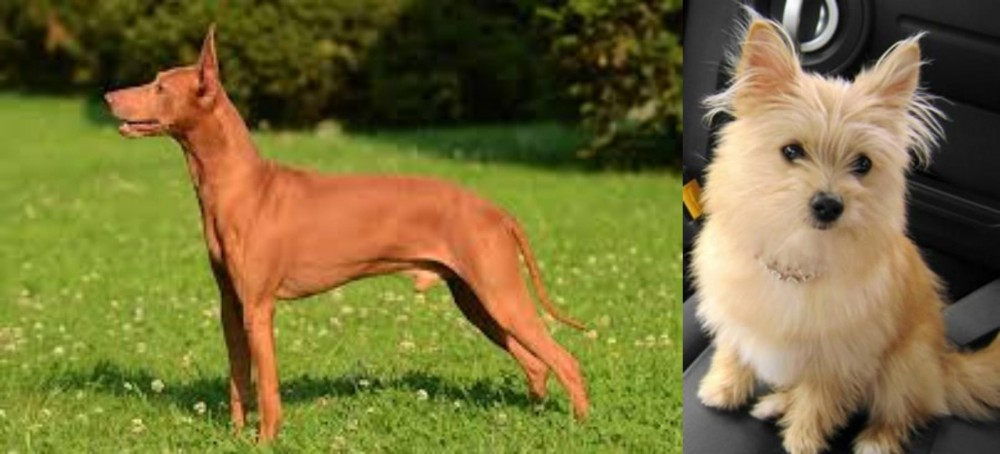 Cirneco dell'Etna is originated from Italy but Yoranian is originated from United States. Cirneco dell'Etna may grow 22 cm / 9 inches higher than Yoranian. Cirneco dell'Etna may weigh 9 kg / 20 pounds more than Yoranian. Both Cirneco dell'Etna and Yoranian has almost same life span. Both Cirneco dell'Etna and Yoranian has same litter size. Cirneco dell'Etna requires Moderate Maintenance. But Yoranian requires Low Maintenance
Cirneco dell'Etna is originated from Italy but Yoranian is originated from United States. Cirneco dell'Etna may grow 22 cm / 9 inches higher than Yoranian. Cirneco dell'Etna may weigh 9 kg / 20 pounds more than Yoranian. Both Cirneco dell'Etna and Yoranian has almost same life span. Both Cirneco dell'Etna and Yoranian has same litter size. Cirneco dell'Etna requires Moderate Maintenance. But Yoranian requires Low Maintenance
Basic Information
undefined
Italy
United States
Life Span:
11 - 12 Years
12 - 14 Years
Other Names:
Sicilian Hound
Yorky Pom • Yorkie Pom • Yorkie-Pom • Yorki-pom • Yorkipom • Yoranian Terrier • Porkie • Pom-Yorkie
Colors Available:
light to dark tan , Light sand
crcream to apricot
Coat:
Short on head, short to semi-long on body
thin Thick, short/medium, shiny, wirehaired double coat
Shedding:
Moderate
Moderate
Temperament:
Energetic, Independent, Intelligent, Lively, Loyal
Curious, Energetic, Intelligent, Loving
Grooming:
Moderate Maintenance
Low Maintenance
Trainability:
Moderate
Easy
New Owners Friendly:
Yes
Yes
History
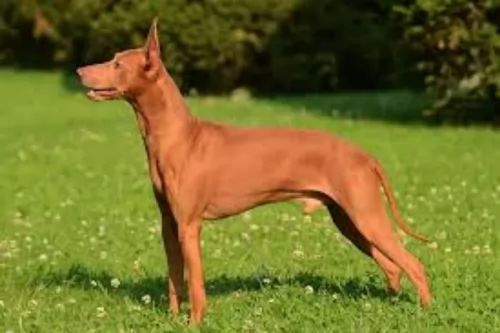 The Cirneco dell’Etna comes from the island of Sicily and not mainland Italy, although it is considered an Italian dog. It is a small dog that hunted rabbits and its calling card was its ability to go for hours without water or food. They have terrific endurance and a good sense of smell. They were developed for the harsh terrain they worked around places like Mount Etna. Of all the Mediterranean island hunting dogs, the Cirneco de’Etna is the smallest.
The Cirneco dell’Etna comes from the island of Sicily and not mainland Italy, although it is considered an Italian dog. It is a small dog that hunted rabbits and its calling card was its ability to go for hours without water or food. They have terrific endurance and a good sense of smell. They were developed for the harsh terrain they worked around places like Mount Etna. Of all the Mediterranean island hunting dogs, the Cirneco de’Etna is the smallest.
This is a very ancient breed, surviving on its hunting skills alone for thousands of years on Sicily. They then became guard dogs for the peasants. Because they had such speed, sense of smell, alertness and sight, they were great hunters.
Today’s Cirneco de’Etna is highly competitive in confirmation and make terrific pets. They are exceedingly friendly, energetic and low maintenance. Lure coursing is what they really excel at. They are good at agility and pursuit games as well.
The Yoranian is a mixed breed, hybrid or “designer” breed. They are a cross between the Pomeranian and the Yorkshire Terrier and are very small dogs. They were developed in Yorkshire, England in the 19th century. It is a very playful, family dog that is not registered with any pure breed club such as the American Kennel Club or AKC.
Description
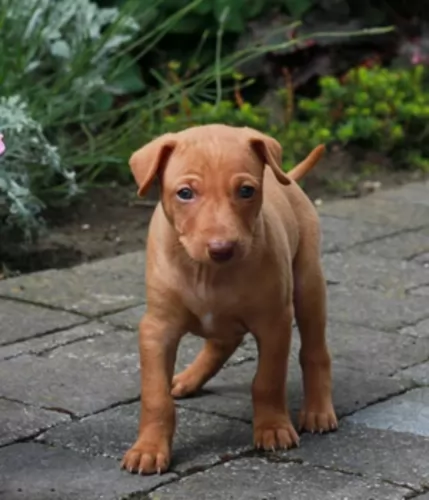 The Cirneco de’Etna is a sleek, muscular sighthound. His ears are close together and high on his head. The head is lean, and the skull is almost flat in profile. The muzzle is about the same length as the skull and the nose is large and its coloring matches the dog’s coat. They have hard pads the same color as their nails, but they are never black.
The Cirneco de’Etna is a sleek, muscular sighthound. His ears are close together and high on his head. The head is lean, and the skull is almost flat in profile. The muzzle is about the same length as the skull and the nose is large and its coloring matches the dog’s coat. They have hard pads the same color as their nails, but they are never black.
The Yoranian is a toy breed, as are both its founding breeds. It checks in at only 7 pounds and stands only 6-10 inches tall. It can have medium or long fur in any combination of the parent’s colors including tan, black, blue or white. They have small ears that stand upright and erect, a small muzzle, medium tail and large round eyes. They can be long and slender like the Yorkshire Terrier or barrel shaped like the Pomeranian.
Characteristics
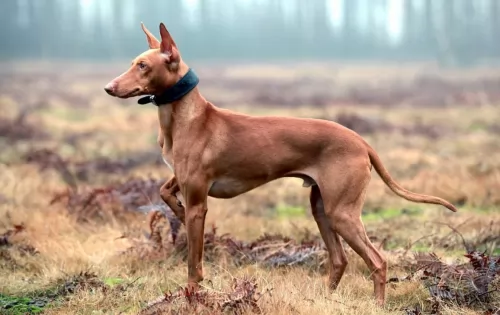 The Cirneco de’Enta is an independent and intelligent breed. They are good-natured and love to be with their people. They are more trainable than the usual sighthound. They are loyal and fun loving but they need a job.
The Cirneco de’Enta is an independent and intelligent breed. They are good-natured and love to be with their people. They are more trainable than the usual sighthound. They are loyal and fun loving but they need a job.
1.Children friendliness absolutely but monitor so that the dog does not get hurt. They are fragile.
2.Special talents – high energy and lots of enthusiasm
3.Adaptability – very adaptable small apartments are great.
4.Learning ability very high gets bored easily
Health Problems
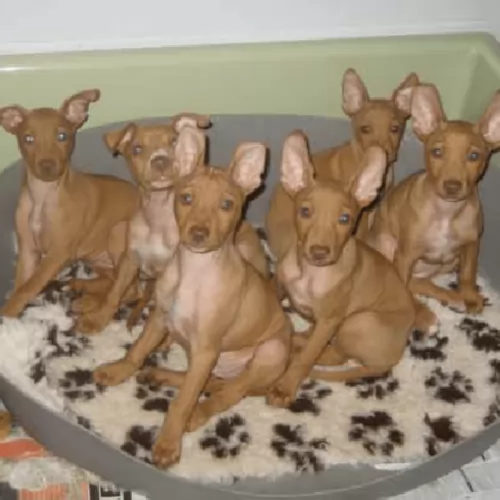 Like many dogs that come from ancient breeds with little cross breeding over the years, there are not a lot of inherited issues for the Cirneco de’Etna. Also, there are so few dogs remaining that little is known about their health in general and there are no studies to go on. Some breeders will do test despite the fact that none are recommended.
Like many dogs that come from ancient breeds with little cross breeding over the years, there are not a lot of inherited issues for the Cirneco de’Etna. Also, there are so few dogs remaining that little is known about their health in general and there are no studies to go on. Some breeders will do test despite the fact that none are recommended.
Their most common health issues are acquired such as injuries from running or competitions and obesity. Both can be controlled by the owner.
The Yoranian has some medical challenges such as:
• A very fragile neck and back. They can be hurt easily.
• Low Blood Sugar must be monitored.
• Eye irritations and dry eyes without enough tear production.
• Dental issues with decay and loss of teeth.
• Patellar Luxation of slipped kneecaps causing lameness.
• Retinal Atrophy can lead to blindness.
Caring The Pet
Feeding
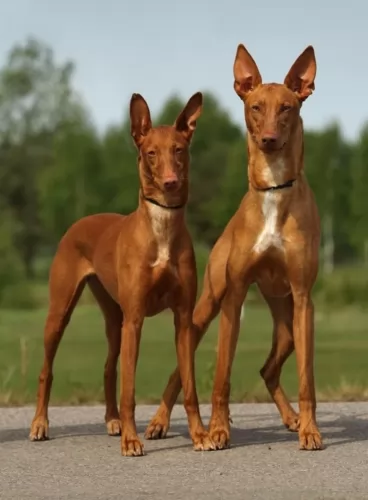 The Cirneco needs a good quality food since they are such high energy dogs. Be careful not to overfeed them so that they become obese.
The Cirneco needs a good quality food since they are such high energy dogs. Be careful not to overfeed them so that they become obese.
Health issues
As previously mentioned, the main concern for owners is injuries acquired while on a running course or in the activities of daily living. They have been known to hurt their feet. They need their ears checked regularly for any signs of infection or irritation. Clean out any excess water or dirt.
Exercise and games
This is an intelligent, hardy breed that needs mental and physical stimulation. They need a job, or they can be a major problem. They love hunting of course but also excel at agility, lure crossing, and competition. He is loyal and loves being with people. Take him for long walks but don’t let him off the leash.
1 Feeding the puppy don’t overfeed and feed small pieces of toy dog food. 3-4 x per day ¼ cup daily
2.Feeding the adult don’t overfeed/ high quality adult toy dog food. Make sure pieces are small. ¼ to ½ cup daily
3.Points for Good Health – lots of energy and enthusiasm
4. Games and Exercises high energy and enthusiasm at least 2 walks a day.
loves to play inside
Comparison with other breeds
- Yoranian vs English Bulldog - Breed Comparison
- Yoranian vs German Shepherd - Breed Comparison
- Yoranian vs Golden Retriever - Breed Comparison
- Yoranian vs Labrador Retriever - Breed Comparison
- Yoranian vs West Highland White Terrier - Breed Comparison
- Yoranian vs French Bulldog - Breed Comparison
- Yoranian vs Beagle - Breed Comparison
- Yoranian vs Yorkshire Terrier - Breed Comparison
- Yoranian vs Poodle - Breed Comparison
- Yoranian vs Rottweiler - Breed Comparison
- Yoranian vs Boxer - Breed Comparison
- Yoranian vs English Pointer - Breed Comparison
- Yoranian vs Siberian Husky - Breed Comparison
- Yoranian vs Doberman Pinscher - Breed Comparison
- Yoranian vs American Bully - Breed Comparison
- Yoranian vs Abruzzenhund - Breed Comparison
- Yoranian vs Affenpinscher - Breed Comparison
- Yoranian vs Afghan Hound - Breed Comparison
- Yoranian vs Aidi - Breed Comparison
- Yoranian vs Airedale Terrier - Breed Comparison
- Yoranian vs Akbash Dog - Breed Comparison
- Yoranian vs Akita - Breed Comparison
- Yoranian vs Africanis - Breed Comparison
- Yoranian vs Askal - Breed Comparison
- Yoranian vs Atlas Terrier - Breed Comparison
- Cirneco dell'Etna vs English Bulldog - Breed Comparison
- Cirneco dell'Etna vs German Shepherd - Breed Comparison
- Cirneco dell'Etna vs Golden Retriever - Breed Comparison
- Cirneco dell'Etna vs Labrador Retriever - Breed Comparison
- Cirneco dell'Etna vs West Highland White Terrier - Breed Comparison
- Cirneco dell'Etna vs French Bulldog - Breed Comparison
- Cirneco dell'Etna vs Beagle - Breed Comparison
- Cirneco dell'Etna vs Yorkshire Terrier - Breed Comparison
- Cirneco dell'Etna vs Poodle - Breed Comparison
- Cirneco dell'Etna vs Rottweiler - Breed Comparison
- Cirneco dell'Etna vs Boxer - Breed Comparison
- Cirneco dell'Etna vs English Pointer - Breed Comparison
- Cirneco dell'Etna vs Siberian Husky - Breed Comparison
- Cirneco dell'Etna vs Doberman Pinscher - Breed Comparison
- Cirneco dell'Etna vs American Bully - Breed Comparison
- Cirneco dell'Etna vs Abruzzenhund - Breed Comparison
- Cirneco dell'Etna vs Affenpinscher - Breed Comparison
- Cirneco dell'Etna vs Afghan Hound - Breed Comparison
- Cirneco dell'Etna vs Aidi - Breed Comparison
- Cirneco dell'Etna vs Airedale Terrier - Breed Comparison
- Cirneco dell'Etna vs Akbash Dog - Breed Comparison
- Cirneco dell'Etna vs Akita - Breed Comparison
- Cirneco dell'Etna vs Africanis - Breed Comparison
- Cirneco dell'Etna vs Askal - Breed Comparison
- Cirneco dell'Etna vs Atlas Terrier - Breed Comparison
 Petzlover
Petzlover Cirneco dell'Etna is originated from Italy but Yoranian is originated from United States. Cirneco dell'Etna may grow 22 cm / 9 inches higher than Yoranian. Cirneco dell'Etna may weigh 9 kg / 20 pounds more than Yoranian. Both Cirneco dell'Etna and Yoranian has almost same life span. Both Cirneco dell'Etna and Yoranian has same litter size. Cirneco dell'Etna requires Moderate Maintenance. But Yoranian requires Low Maintenance
Cirneco dell'Etna is originated from Italy but Yoranian is originated from United States. Cirneco dell'Etna may grow 22 cm / 9 inches higher than Yoranian. Cirneco dell'Etna may weigh 9 kg / 20 pounds more than Yoranian. Both Cirneco dell'Etna and Yoranian has almost same life span. Both Cirneco dell'Etna and Yoranian has same litter size. Cirneco dell'Etna requires Moderate Maintenance. But Yoranian requires Low Maintenance The Cirneco dell’Etna comes from the island of Sicily and not mainland Italy, although it is considered an Italian dog. It is a small dog that hunted rabbits and its calling card was its ability to go for hours without water or food. They have terrific endurance and a good sense of smell. They were developed for the harsh terrain they worked around places like Mount Etna. Of all the Mediterranean island hunting dogs, the Cirneco de’Etna is the smallest.
The Cirneco dell’Etna comes from the island of Sicily and not mainland Italy, although it is considered an Italian dog. It is a small dog that hunted rabbits and its calling card was its ability to go for hours without water or food. They have terrific endurance and a good sense of smell. They were developed for the harsh terrain they worked around places like Mount Etna. Of all the Mediterranean island hunting dogs, the Cirneco de’Etna is the smallest. The Cirneco de’Etna is a sleek, muscular sighthound. His ears are close together and high on his head. The head is lean, and the skull is almost flat in profile. The muzzle is about the same length as the skull and the nose is large and its coloring matches the dog’s coat. They have hard pads the same color as their nails, but they are never black.
The Cirneco de’Etna is a sleek, muscular sighthound. His ears are close together and high on his head. The head is lean, and the skull is almost flat in profile. The muzzle is about the same length as the skull and the nose is large and its coloring matches the dog’s coat. They have hard pads the same color as their nails, but they are never black. Like many dogs that come from ancient breeds with little cross breeding over the years, there are not a lot of inherited issues for the Cirneco de’Etna. Also, there are so few dogs remaining that little is known about their health in general and there are no studies to go on. Some breeders will do test despite the fact that none are recommended.
Like many dogs that come from ancient breeds with little cross breeding over the years, there are not a lot of inherited issues for the Cirneco de’Etna. Also, there are so few dogs remaining that little is known about their health in general and there are no studies to go on. Some breeders will do test despite the fact that none are recommended. The Cirneco needs a good quality food since they are such high energy dogs. Be careful not to overfeed them so that they become obese.
The Cirneco needs a good quality food since they are such high energy dogs. Be careful not to overfeed them so that they become obese.